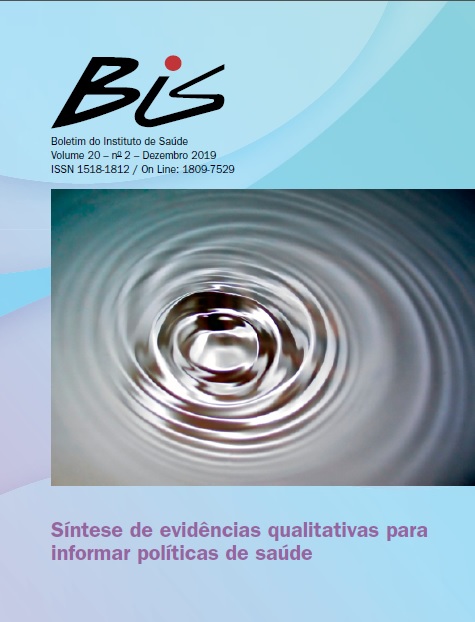Resumo
Revisões de escopo apresentam expressão mundial na área da saúde, podendo ser adotadas para compreender tipos de pesquisa, como e por quem foram realizadas, entre outras ca-tegorias desconhecidas. Objetivos: Descrever o processo de de-senvolvimento de revisão de escopo, de caráter metodológico, que reuniu estudos primários qualitativos, e analisar particularidades desse tipo de revisão. Método: Relato de experiência, que tomou como referência o guia para relatório de revisão PRISMA-ScR, para descrever os ensinamentos empíricos no desenvolvimento de uma revisão de escopo sobre a utilização da pesquisa-ação em inves-tigações na área da saúde. Resultados: Adaptou-se o mnemônico PCC, de forma que o C, de conceito, foi decomposto em partici-pação, produção de conhecimento e transformação de práticas, princípios da pesquisa-ação que foram incluídos como categorias no instrumento de extração de dados, cuja elaboração é um dos maiores desafios desse tipo de revisão. A revisão mapeou “como” evidências provenientes de pesquisa-ação são produzidas e mos-trou-se potente para expor de forma sistemática os arcabouços teórico-metodológicos dos estudos primários examinados, a partir de rigorosa aplicação das etapas. Conclusão: A extensão PRISMA--ScR mostrou-se minuciosa e alinhada ao guia do Instituto Joanna Briggs, constituindo instrumento fundamental para a transparên-cia e confiabilidade desse tipo de revisão.
Referências
2. Grant MJ, Booth A. A typology of reviews: an analysis of 14 types and associate methodologies. Health Information and Library Journal. 2009; 16: 91-108.
3. Peters MD, Godfrey CM, Khalil H, McInerney P, Parker D, Soares CB. Guidance for conducting systematic scoping re-views. Int J Evid Based Healthc. 2015; 13:141-6.
4. Peters MDJ, Godfrey C, McInerney P, Baldini Soares C, Khalil H, Parker D. Scoping reviews. In: Aromataris E, Munn Z, editors. Joanna Briggs Institute Reviewer’s Manual. Aus-tralia: Joanna Briggs Inst; 2017. p.
5. Langlois EV, Daniels K, Akl EA, editors. Evidence synthe-sis for health policy and systems: a methods guide. Geneva: World Health Organization; 2018.
6. Toma TS, Barreto JOM. Métodos na EVIPNet Brasil: ferra-mentas SUPPORT para políticas informadas por evidências. BIS, Bol Inst Saúde . 2016; 17:43-49.
9. Munn Z, Peters M, Stern C, Tufanaru C, McArthur A, Aro-mataris E. Systematic review or scoping review? Guidance for authors when choosing between a systematic or sco-ping review approach. BMC Med Res Methodol [internet]. 2018 [acesso em: 8 ago 2019]. Disponível em: https://doi. org/10.1186/s12874-018-0611-x.
10. Guba EC. The alternative paradigm dialog. In: Guba EC, editor. The paradigm dialog. Newbury Park: Sage Publica-tions; 1990:17-27.
11. Minayo MCS. O desafio do conhecimento: pesquisa qua-litativa em saúde. 3. ed. São Paulo: Hucitec-Abrasco; 1992.
12. Soares CB, Hoga LAK, Matheus MCC. Revisão siste-mática de estudos qualitativos e síntese de evidências. In: Barbosa D, Taminato M, Fram D, Belasco A, organizadoras. Enfermagem baseada em evidências. São Paulo: Atheneu; 2014. p. 79–92.
13. Cordeiro L, Soares CB. Action research in the healthca-re field: a scoping review. JBI Database Syst Rev Implement Rep. 2018; 16(4):1003-1047.
14. Reason P, Bradburry H. Introduction. In: Reason P, Bra-dburry H, editors. The SAGE Handbook of action research: participative inquiry and practice. 3. ed. London: Sage; 2008. p.?
15. Cordeiro L, Soares CB, Rittenmeyer L. Unscrambling method and methodology in Action Research traditions: the-oretical conceptualization of praxis and emancipation. Qua-lit Res. 2017; 7(4):395-407.
16. Alves-Mazzotti AJ, Gewandsznajder F. O método nas ci-ências naturais e sociais: pesquisa quantitativa e qualitati-va. São Paulo: Pioneira Thomson Learning; 1999.
17. Centre for Review and Dissemination. Guidance notes for registering a systematic review protocol with PROSPERO [internet]. 2016 [acesso em 10 abr 2019]. Disponível em: https://www.crd.york.ac.uk/PROSPERO
18. Cordeiro L, Soares CB, Rittenmeyer L. Action resear-ch methodology in the health care field: a scoping review protocol. JBI Database System Rev Implement Rep. 2015; 13(8):70-78.

Este trabalho está licenciado sob uma licença Creative Commons Attribution 4.0 International License.
Copyright (c) 2019 Luciana Cordeiro, Cassia Baldini Soares
